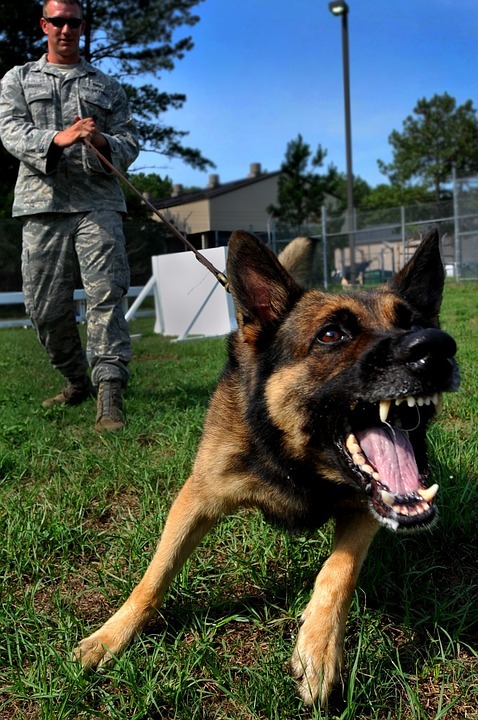Most dog owners might have come across situations where their pet starts growling at approaching strangers. Not all methods work while trying to stop a dog from growling. Right initial steps involve taking care of the actual cause that makes them growl. Read this article to understand the various probabilities that can trigger growling behavior in dogs.
Why Do Dogs Growl At Strangers?
Growling falls under “reactivity” dog behavior and is often accompanied by barking. It is a way dogs communicate about fear, anxiety, and threats. There could be more aggression following a dog’s growling. So, it becomes crucial to handle such situations with care. Rather than punishing a dog for growling, identifying the underlying reasons and addressing them are important. Also, consider installing dog fencing as this can help seperate the dog from the irritant. Also, consider installing dog fencing as this can help seperate the dog from the irritant.
1. Playing Or Greeting
Playfulness can be an obvious reason for dog growls. If a dog is happy seeing strangers at your gate, it might start to growl out of excitement. Dogs usually growl when among other dogs, especially while playing with tug toys. These are supposed to be harmless expressions and short-lasting. However, without proper monitoring, such situations might quickly turn aggressive as well. As such, dogs need to be trained from early stages on proper alternative ways of greeting strangers.
2. Fear Or Anxiety
Another common situation when dogs do growl at strangers is in fear. This can happen with specific kinds of people or unfamiliar places. Untreated fear can develop into anxiety disorders in some aggressive dog breeds too. It is vital to identify situations that can trigger fear in dogs before any successful removal of such triggers is attempted. Behavioral specialists can be helpful with this. Fear or anxiety is not good for any dog and can lead to over-aggression or restlessness towards strangers.
3. Territoriality
Dogs are territorial by nature. If they feel somebody is trespassing their territory, they are quick to react. They may growl or bark to let strangers know about this too. This is why most dogs can be seen growling or barking at mail carriers and delivery persons. Dogs may also growl at their masters if they feel a threat to their own territories like a couch or a spot on the bed. However, behavioral modifications can be easier in such situations and specialists can help.
4. Possession Aggression
Resource guarding might lead a dog to growl at approaching strangers while they are either eating or chewing on a rawhide. However, such reactions of possession aggression can be rectified through appropriate training. Early socialization of dogs might teach them many healthy ways to react or not around people and animals alike.
How To Stop Growling At Strangers
Dog owners usually scold or punish their pets to stop them from growling at strangers. However, by doing so, you might be sending the wrong message to your dog. You might be curtailing its natural tendency to warn you of further aggression. Growling is a dog’s way of warning about some discomfort to its senses. The following steps can help address the underlying problems to eliminate growling issues in a more strategic way:
1. Proper Training
Professional training for dogs can yield excellent results in minimizing fear, territoriality, and related problems. Depending on behavioral issues, dogs might require additional behavioral modification programs too. Animal behaviorists can be particularly helpful in evaluating dog problems and suggesting fruitful corrective measures. Dog owners on the other hand need to be as specific as possible about triggers for their dog’s growling while asking for help.
2. Rewarding For Good Behavior
Dogs do things that may get them the things they want. Consequently, if a dog gets its favorite treat for the right actions then it is more likely to repeat that often. Punishing dogs can be stressful and not exactly the right way for training. Positive reinforcements from puppy stages can help dogs interpret the rewarding nature for behaving well correctly. Such joy can keep canines confident and less likely to suffer from anxiety disorders as well. Mentally and emotionally stable dogs are more likely to behave better around strangers.
3. Early Socialization
Socializing dogs from an early age makes them more confident around other pets and strangers. They get more used to seeing new places and objects to overcome any shyness or fear within. In fact, socializing can be the perfect conditioning your dogs need before formal training programs. This can go a long way to eliminate any growling problems when they see strangers approaching. Socializing also enhances the bond between dog owners and their pets, and they might start obeying commands better too. That way, if a dog starts growling to a trigger, it can be controlled through alternate commands.
Dogs pick up the vibes around their masters. As such, a dog can sense the tension build up in their owners when strangers approach and start to growl. Instead, if they realize their owners are happy to see and meet new people, such behavior can rub onto them quickly

